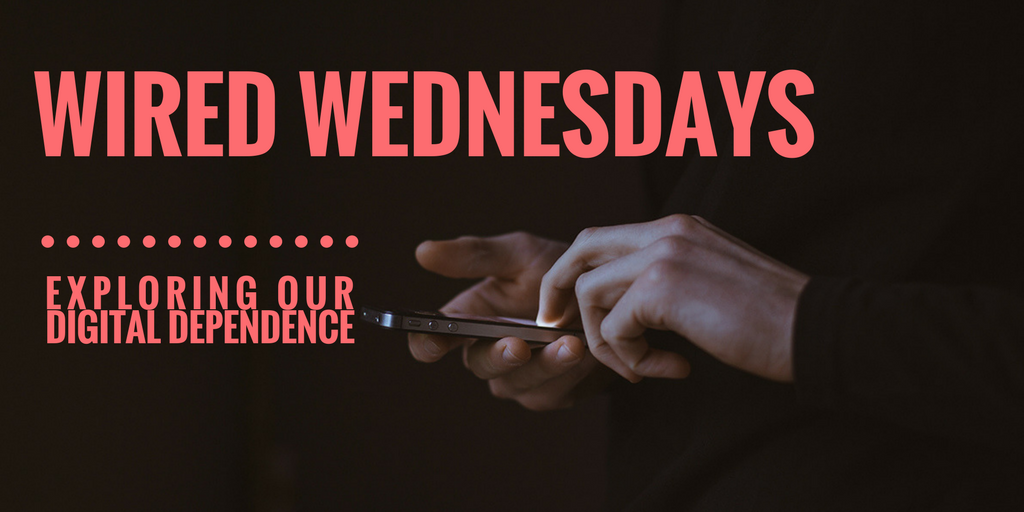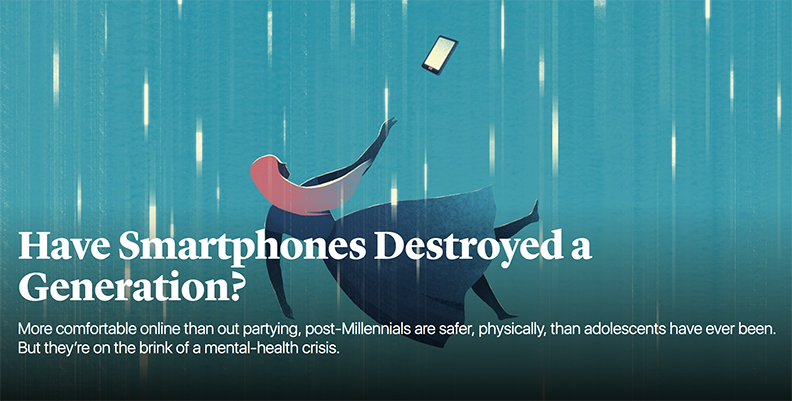![]()

![]() Today I’m spotlighting an essential article about the current smartphone generation in the September issue of The Atlantic: “Have Smartphones Destroyed a Generation?” The author* is Jean Twenge, a psychologist who studies generational characteristics and the influences that have created significant differences between generations.
Today I’m spotlighting an essential article about the current smartphone generation in the September issue of The Atlantic: “Have Smartphones Destroyed a Generation?” The author* is Jean Twenge, a psychologist who studies generational characteristics and the influences that have created significant differences between generations.
[*I forgive her the doomsday title, since she most likely didn’t write it; usually it’s the editorial department who crafts a title that will grab readers.]
Dr. Twenge actually played a key part in Parenting for Peace: though not in the actual book, I referenced her important work in my book proposal. A book proposal is a booklet-length document carefully crafted to make a case that convinces a publisher that your book is even worth publishing. Here is a passage from my (never before published) book proposal, back when my working title (little-known P4P trivia) was Raising Generation PAX:
Raising Generation PAX will handily and helpfully reconcile the seeming contradiction between the central theories of two important books about its target reader—Jean Twenge’s Generation Me: Why Today’s Young Americans Are More Confident, Assertive, Entitled—And More Miserable Than Ever Before, and Neil Howe’s and William Strauss’ Millennials Rising.
Howe and Strauss see Gen Y’ers as the next “Great Generation”—optimistic, hard-working community builders who, because of increased use of contraceptives as well as fertility drugs, were wanted as children, and who engage in less teen sex and even embrace virginity as a “cool new trend.”
But Twenge offers research showing that while both Gen Y and Gen X possess capacities needed for greatness, such as idealism and self-assurance, they are also more depressed and self-centered, all qualities that can derail any potential for greatness. Publisher’s Weekly writes that Twenge’s call to “ditch the self-esteem movement in favor of education programs that encourage empathy and real accomplishment could spare some Me-ers from the depression that often occurs when they hit the realities of today’s increasingly competitive workplace,” and Booklist cites Twenge’s observation that “today’s young parents are especially lenient with their children and reluctant to discipline them, suggesting that perhaps the next generation will be even worse off. Twenge believes Generation Me would benefit from a heavy dose of realism.”
By putting its finger precisely on where parents (abetted by society) have been going wrong in their efforts to instill “self-esteem”—and how this has ironically sown seeds for their children’s insecurity and even depression—and by articulating precisely (and simply!) what constitutes a healthy, constructive approach to discipline, Raising Generation PAX will serve as a roadmap for guiding Gen Y readers toward the fulfillment of the lofty potential foreseen by Howe and Strauss, while answering as its central thesis Twenge’s call for an education that encourages empathy.
Ironically, Twenge’s sobering observations about the smartphone generation don’t appear in my book, since the tipping point for those generational effects came in 2012, the same year my book was published.
A Wake-Up Call About the Smartphone Generation

![]() Typical of the excellent journalism in The Atlantic, this article about the smartphone generation is quite long. It is also quite important. I’m hoping that by including a few key excerpts here, I can entice you to read Dr. Twenge’s entire article.
Typical of the excellent journalism in The Atlantic, this article about the smartphone generation is quite long. It is also quite important. I’m hoping that by including a few key excerpts here, I can entice you to read Dr. Twenge’s entire article.
Around 2012, I noticed abrupt shifts in teen behaviors and emotional states. The gentle slopes of the line graphs became steep mountains and sheer cliffs, and many of the distinctive characteristics of the Millennial generation began to disappear. In all my analyses of generational data—some reaching back to the 1930s—I had never seen anything like it.
What happened in 2012 to cause such dramatic shifts in behavior? It was after the Great Recession, which officially lasted from 2007 to 2009 and had a starker effect on Millennials trying to find a place in a sputtering economy. But it was exactly the moment when the proportion of Americans who owned a smartphone surpassed 50 percent.
The arrival of the smartphone has radically changed every aspect of teenagers’ lives, from the nature of their social interactions to their mental health. These changes have affected young people in every corner of the nation and in every type of household. The trends appear among teens poor and rich; of every ethnic background; in cities, suburbs, and small towns. Where there are cell towers, there are teens living their lives on their smartphone.
More comfortable in their bedrooms than in a car or at a party, today’s teens are physically safer than teens have ever been. They’re markedly less likely to get into a car accident and, having less of a taste for alcohol than their predecessors, are less susceptible to drinking’s attendant ills. Psychologically, however, they are more vulnerable than Millennials were: Rates of teen depression and suicide have skyrocketed since 2011. It’s not an exaggeration to describe iGen as being on the brink of the worst mental-health crisis in decades. Much of this deterioration can be traced to their phones.
Even when a seismic event—a war, a technological leap, a free concert in the mud—plays an outsize role in shaping a group of young people, no single factor ever defines a generation. Parenting styles continue to change, as do school curricula and culture, and these things matter. But the twin rise of the smartphone and social media has caused an earthquake of a magnitude we’ve not seen in a very long time, if ever. There is compelling evidence that the devices we’ve placed in young people’s hands are having profound effects on their lives—and making them seriously unhappy.
Teens who spend three hours a day or more on electronic devices are 35 percent more likely to have a risk factor for suicide, such as making a suicide plan. (That’s much more than the risk related to, say, watching TV.) One piece of data that indirectly but stunningly captures kids’ growing isolation, for good and for bad: Since 2007, the homicide rate among teens has declined, but the suicide rate has increased. As teens have started spending less time together, they have become less likely to kill one another, and more likely to kill themselves. In 2011, for the first time in 24 years, the teen suicide rate was higher than the teen homicide rate.
For all their power to link kids day and night, social media also exacerbate the age-old teen concern about being left out. Today’s teens may go to fewer parties and spend less time together in person, but when they do congregate, they document their hangouts relentlessly—on Snapchat, Instagram, Facebook. Those not invited to come along are keenly aware of it. Accordingly, the number of teens who feel left out has reached all-time highs across age groups. Like the increase in loneliness, the upswing in feeling left out has been swift and significant.
Social-media companies are of course aware of these problems, and to one degree or another have endeavored to prevent cyberbullying. But their various motivations are, to say the least, complex. A recently leaked Facebook document indicated that the company had been touting to advertisers its ability to determine teens’ emotional state based on their on-site behavior, and even to pinpoint “moments when young people need a confidence boost.”
Prying the phone out of our kids’ hands will be difficult, even more so than the quixotic efforts of my parents’ generation to get their kids to turn off MTV and get some fresh air. But more seems to be at stake in urging teens to use their phone responsibly, and there are benefits to be gained even if all we instill in our children is the importance of moderation. Significant effects on both mental health and sleep time appear after two or more hours a day on electronic devices. The average teen spends about two and a half hours a day on electronic devices. Some mild boundary-setting could keep kids from falling into harmful habits.
Don’t you agree that it’s worth some quixotic efforts to shelter adolescence as devotedly as we shelter childhood? (If you’re a P4p-inclined parent, you know what I’m referring to.) Because here’s the thing: seeking novelty, risk and the company of peers are traits that have always (until now) defined the adolescent, and for essential evolutionary reasons. They have primed young humans through millennia to embark on a very risky–and very necessary–maneuver: to leave a safe home and venture into unfamiliar territory.
If you want your child to happily, successfully leave the nest when the time comes, this is worth your attention. ![]()
![]()
![]()
Whether you’re curious, captivated or concerned about our digital dependence and device devotion, join me on (most) Wednesdays so we can explore it together. (Sign up here if you want to be sure not to miss anything!) ….. ….. ![]()
Stay in the Wired Wednesdays Loop:
I’ll Notify You About New Posts
![]()
Tags: digital-dependence, Generation Me, handheld devices, iGen, Jean Twenge, millennials, smartphones, technology, teen suicide, teens


